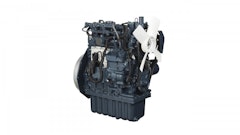
The Diesel Technology Forum issued the following statement regarding the final report of the multi-year Advanced Collaborative Emissions Study (ACES) conducted by the Boston-based Health Effects Institute (HEI).
The Boston-based Health Effects Institute (HEI) conducted the independent study of new technology diesel engines to determine whether the engines achieved the expected emissions reductions, thereby improving air quality for public health, as well as whether the new technologies resulted in any unintended increases in emission components. The study concluded that exposure to new technology diesel exhaust does not cause any increase in the risk of lung cancer or other significant adverse health effects in study animals.
“The significance of this study and its conclusions cannot be overstated,” said Allen Schaeffer, the Executive Director of the Diesel Technology Forum. “The results of this new study verify the environmental benefits of the new clean diesel technology, which have near-zero emissions for nitrogen oxides (NOx), hydrocarbons (HC) and particulate matter (PM). And while this study focused on heavy duty truck emissions, the new clean diesel technology has the potential for impacting all sectors, including passenger cars, agriculture, construction, maritime and transportation.
“The comprehensive nature of this study by such an authoritative body as the Health Effects Institute is extremely significant. It’s also important to highlight that the U.S. Environmental Protection Agency (EPA), the California Air Resources Board, the U.S. Department of Energy (DOE) and the U.S. Federal Highway Administration are sponsors of this study in conjunction with the manufacturers of emissions control equipment.”
ACES is a cooperative multi-party effort managed in a coordinated manner by two well-respected non-profit science-based organizations, the Health Effects Institute (HEI) and the Coordinating Research Council (CRC). The overall effort has been guided by an ACES Steering Committee, which is advisory to HEI and CRC. It includes representatives of the U.S. EPA, U.S. Department of Energy, California Air Resources Board, American Petroleum Institute, National Resources Defense Council, National Institutes of Occupational Safety and Health, Engine Manufacturers, Emission Control Manufacturers, the Petroleum Industry and others. Most importantly, the ACES effort has been guided by an independent Oversight Committee comprised primarily of academic scientists. This independent Oversight Committee had a central role in the design of the ACES study.



























